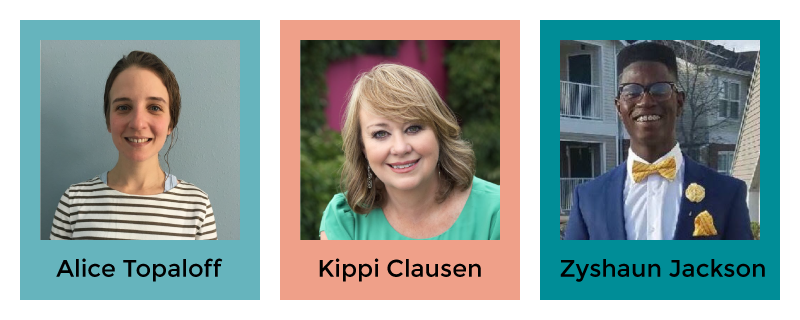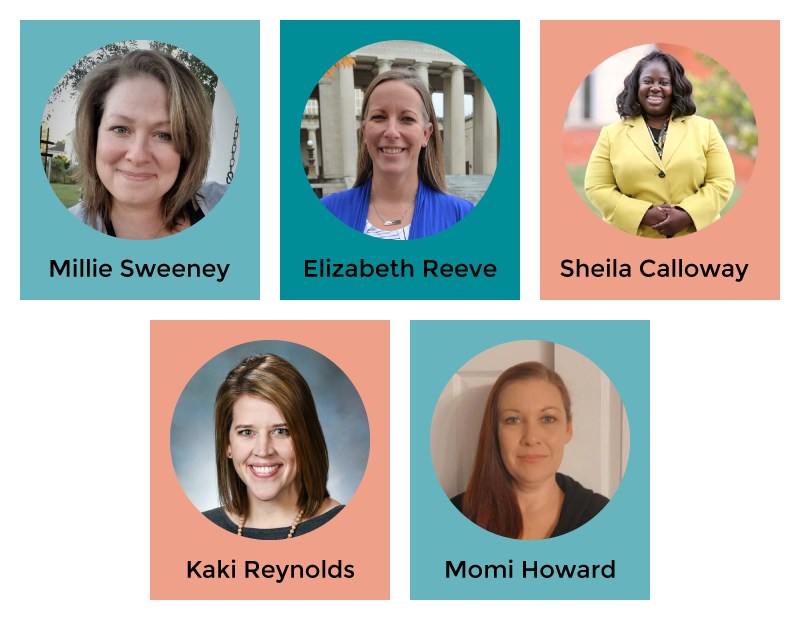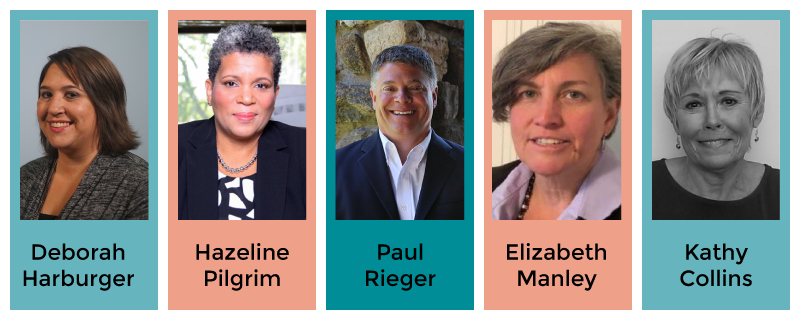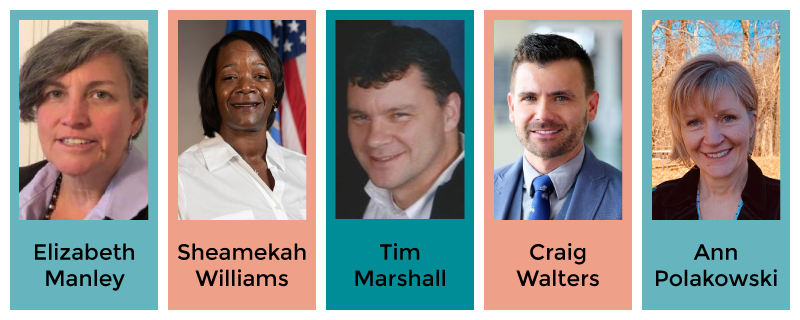Past Session Recordings
Kick-Off Date: January 14, 2021
Click here to access past recordings and PowerPoint presentations.
Rethinking Implicit Bias: Implications for Promoting Equity in Our Communities ▾

Linda M. Callejas, PhD, Research Assistant Professor, Department of Child & Family Studies, University of Southern Florida
Selena Webster-Bass, MPH, CEO/Lead Innovator, Voices Institute, LLC
The term implicit bias is widely used today in a variety of contexts to explain situations that lead to unintentional discriminatory outcomes. With regard to healthcare, implicit bias is used to explain the ways in which attitudes about diverse populations can result in disproportionately poor health and social outcomes for these groups, such as increased representation in more restrictive/coercive settings, disparities in access and quality of care, and reduced life expectancy. Implicit bias as a concept has many challenges that can limit efforts to more widely address unequal treatment of certain groups in our society and promote behavioral health equity. This workshop presents a critical view of the implicit bias concept and reviews recent research on the concept, the ways in which it has been operationalized, and how it has shaped organizational practices and the training of behavioral health professionals. Presenters challenge participants to consider the social aspects of bias and the implications for behavioral healthcare organizations serving young people and their families. Strategies for addressing broader social contexts and conditions are be also discussed as examples of addressing bias and discrimination in communities.
Strengthening Services by Using Evidence & Partnership ▾

Jessie Watrous, MPA, Director, Evidence-Based Programs, The Institute for Innovation & Implementation, University of Maryland, Baltimore, School of Social Work
Robert Franks, PhD, President & CEO, Judge Baker Children’s Center, Harvard University
Suzanne Kerns, PhD, Research Associate Professor & Executive Director, Graduate School of Social Work’s Center for Effective Interventions, University of Denver
In this workshop you will learn about best practices to develop an evidence-based service array to better meet the needs of youth and families and improve outcomes. Presenters offer a framework for understanding evidence-based practices (EBPs) in today’s context and share strategies and tools to identify and address gaps in your existing service array and select EBPs that fit your system, community or agency. Specifically, presenters address the following topics: 1) assessing population strengths and needs; 2): identifying gaps in services and setting priorities to fill gaps; 3) selecting an EBP that “fits” and differentiating similar EBPs; 4) leveraging public funding to support priorities and develop your array of EBPs , 5) developing an infrastructure to support quality implementation of EBPs at scale; and 6) supporting “front-line” practice change to maximize use of EBPs. This session kicks off a webinar series on EBPs where each of these topics will be explored in depth.
February 4, 2021
Click here to access past recordings and PowerPoint presentations.
Helping Youth and Families During COVID-19: A Trauma Informed Approach ▾

Christopher Bellonci, MD, FAACAP, Vice President of Policy and Practice, Chief Medical Officer, Assistant Professor, Harvard Medical School, Judge Baker Children’s Center
Kim Batche-McKenzie, LMSW, Director, Division of Mental Health Services to Children and Families, Behavioral Health and Developmental Disability Administration, Michigan Department of Health and Human Services
Mary Ludke, Innovative Services Section Manager, Division of Mental Health Services to Children and Families, Michigan Department of Health and Human Services
Laurel Omland, Director, Child, Adolescent and Family Division, Vermont Department of Mental Health
Since the onset of the COVID-19 pandemic in the United States, there has been a 44% decrease in mental health services for children insured through Medicaid and the Children’s Health Insurance Program (CHIP). Reports to child welfare reporting hotlines were down as much as 50% and have still not returned to baseline numbers. And a Centers for Disease Control and Prevention (CDC) survey of 18-24 years olds revealed that more than 25% had seriously considered suicide in the preceding 30 days. How do we support resiliency in the face of a pandemic? How do we ensure that our responses systematically address the inequities that the pandemic has revealed? How do we prevent the grief that so many children and families have been exposed to from depression and post-traumatic stress disorder (PTSD)? This engaging workshop will frame the challenges and offer solutions with concrete, practical, and trauma-informed approaches to the unprecedented challenges of our times.
Measuring Implementation of Behavioral Health Services at the State, System, and Program Levels ▾

Eric Bruns, PhD, Clinical Psychologist and Professor of Psychiatry and Behavioral Sciences, University of Washington School of Medicine
System- and organizational-level factors have been shown to have a clear influence on the quality of implementation of healthcare innovations. In response, entities such as the National Technical Assistance Network for Children's Behavioral Health (TA Network) and the National Wraparound Implementation Center (NWIC) are increasingly emphasizing data collection and feedback on system- and program-level implementation in their work to transform systems of care and improve the quality of behavioral health care provided to youth and families. In this workshop, the presenter will highlight specific measures and strategies used for service models such as wraparound care coordination and intensive in-home behavioral health treatment (IIBHT) services. Presenters will detail a range of relevant measures that can be used or adapted. In addition, they will highlight specific examples of how the measures and measurement foci can inform multiple critical elements of the behavioral health service implementation process at the state, system, and program levels, including coaching system and organizational leaders, continual quality assurance, evaluation of process and impact, and generalizable research.
State and Organizational Level Strategies for Implementing High-Quality, Fidelity Wraparound ▾

Kimberly Estep, MA, Division Director for Implementation and Workforce Development, Clinical Instructor, and Director, National Wraparound Implementation Center, The Institute for Innovation and Implementation, University of Maryland, School of Social Work
Sara Strader, MS, Director, The Texas Center, The Institute for Innovation and Implementation, University of Maryland, School of Social Work
Implementing high-quality, fidelity Wraparound requires more than just coaching and training. It also requires a hospitable environment with both state system-level supports and a supportive organization. This workshop will focus on two tools that can be used to guide Wraparound implementation -- the Wraparound Implementation Standards - Program (WISP) and the Wraparound Implementation Standards - System (WISS). These tools operationalize the Wraparound Implementation Practice and Quality Standards and provide a practical method to address the state system and organizational level strategies needed for effective implementation. Presenters will orient participants to the WISS and the WISP and describe how the tools can be used throughout the implementation process to assess where the implementation is on track and what gaps may need to be addressed.
The Evolving Landscape of Behavioral Health Technology: Innovations, Applications and Outcomes ▾

Kelly Hyde, PhD, LPCC, FidelityEHR
Mary Curry, PhD, LCSW, FidelityEHR
Jake Mickley, BS, CEO, Hanford Technology
Technology innovations are fast becoming a part of the behavioral health (BH) landscape. Future advances in BH technology have the potential to facilitate the role of BH within the overall health care system and to help foster improvement in practice fidelity, whole client health, staff retention and operations. This workshop will focus on a brief history of technology adoption and use in healthcare, and specifically within BH. Three innovative technologies will be explored: 1) artificial intelligence (AI)/machine learning (ML) (prescriptive and predictive analytics), 2) Blockchain for protected health information (PHI) access and exchange, and 3) Internet of Things (IOT) (wearables, apps, virtual reality). Relevant applied examples of each of these technologies will be provided, and a summary of the benefits and challenges in using these technologies will be explored. Presenters will provide a process for participants to identify their BH organization’s "big needs" and consider how these innovative technologies could potentially provide solutions.
March 4, 2021
Click here to access past recordings and PowerPoint presentations.
Providing Comprehensive School Mental Health Services ▾

Sharon Hoover, PhD, Director, National Center for School Mental Health, University of Maryland Baltimore School of Medicine
Samantha Reaves, PhD, Director, National Center for School Mental Health, University of Maryland Baltimore School of Medicine
This workshop will focus on comprehensive school mental health systems and strategies for integrating school mental health services with systems of care. Presenters will define the core features of school mental health systems, review the value and impact of effective school mental health services, and provide an overview of the current state of the school mental health field. Specific strategies will be provided for fostering the widescale adoption of comprehensive school mental health systems, including implementation strategies at the system and service delivery levels. States and communities that have made significant progress in implementing school mental health systems will be highlighted. Resources including a free online system for assessing school mental health quality improvement and a guidance document on school mental health will be made available to participants.
Maximizing Telehealth Services to Reach Youth and Families ▾

Stuart Yael Gordon, JD, Retired, Former Senior Director of Policy and Communications, National Association of State Mental Health Program Directors
Eric Tadehara, LCSW, MPA, Assistant Director of Children’s Behavioral Health, Utah Division of Substance Abuse and Mental Health
Kristin Savicki, PhD, Child Clinical Systems Team Office of Behavioral Health, Louisiana Department of Health
This workshop will outline the history of telehealth services and how they are currently being implemented and expanded to meet the needs of youth and families during the COVID-19 pandemic. Presenters will provide an overview of the restrictions on telehealth services that existed prior to the pandemic and will describe the flexibilities that have been made available to states and providers under sec. 1135 Public Health Emergency (PHE) during the COVID-related PHE and how they have impacted access to behavioral health services. Presenters will also discuss which of these flexibilities have been adopted for use following the PHE until the end of 2021, which have been adopted on a permanent basis, and what additional flexibilities advocates within the behavioral health community are seeking to see adopted permanently. Examples of how telehealth services are being used to reach youth and families during the COVID-19 pandemic will be shared to demonstrate how these services can be applied in other states and communities.
Strategies for Implementing High-Fidelity Early Childhood Evidence-Based Practices ▾

Kate Sweeney Wasserman, MSW, LCSW-C, Director, Parent, Infant, Early Childhood (PIEC) Program, The Institute for Innovation and Implementation, University of Maryland School of Social Work
Amanda Costello, PhD, Assistant Professor, University of Delaware
Ashley Fehringer, MPH, Training Specialist, Parent, Infant and Early Childhood (PIEC) Program, The Institute for Innovation and Implementation, University of Maryland School of Social Work
This workshop will focus on implementing evidence-based practices (EBPs) for early childhood with high fidelity. Fidelity is the faithfulness with which a program or practice is implemented and is critical for maximizing the likelihood of replicating the outcomes found in evaluation and research. Significant efforts to train, certify, and support clinicians is needed to ensure that EBPs are implemented and provided with high fidelity to the models. This requires intensive didactic and skills acquisition training that includes both performance and competency-based components. Presenters will share strategies for the initial training for certification of EBP providers, including didactic instruction, supervision, monitoring, video observation, feedback, and support. In addition, strategies will be provided for post-certification training to increase and sustain fidelity to the model without the direct support of expert trainers. Three specific EBPs provided in community-based settings for young children and their families will be highlighted to illustrate strategies for high-fidelity implementation to ensure that children and families receive the best possible outcomes -- Parent Child Interaction Therapy (PCIT) SEFEL Pyramid Model (SEFEL) and Attachment Biobehavioral Catchup (ABC).
Building Youth Engagement Best Practices: Start with Assessment ▾

Alice Topaloff, Operations Coordinator, Youth MOVE National
Kippi Clausen, Founder & CEO, Unfolding Directions
Zyshaun Jackson, Joint Initiatives for Youth and Families
This workshop will introduce participants to a validated assessment for measuring the extent to which youth and young adults are meaningfully involved in advising and decision-making in agencies -- the Youth Voice at the Agency Level (Y-VAL). The Y-VAL provides a framework of key indicators for youth/young adult voice in program design at the agency and system level, and measures areas including overall vision, commitment to and support of youth participation, workforce development to ensure meaningful participation, participation in program development and policies, participation in evaluation and quality assurance, and leading initiatives and projects. This assessment can be used for research. program evaluation, and strategic planning. It serves to educate stakeholders about best practices for youth involvement, while also allowing them to assess the extent to which they have implemented these practices. Presenters will showcase an example of how the tool was implemented in several agencies in Colorado and how the results were used to move forward with a statewide strategic planning process, with a view towards demonstrating how participants may use the Y-VAL in their organizations.
April 1, 2021
Click here to access past recordings and PowerPoint presentations.
Making Change Stick: Implementing Bolder Policies to Enhance the Lives of Young Adults ▾

Gwendolyn White, MSW, Training and Technical Assistance Consultant, National Training and Technical Assistance Center for Child, Youth, and Family Mental Health
Johanna Bergan, Executive Director, Youth MOVE National
Maryann Davis, PhD, Professor of Psychiatry (Psychology), Director of the Implementation Science and Practice Advances Research Center (iSPARC), and Director of the Transitions to Adulthood Center for Research (Transitions ACR) University of Mass Medical School
Youth and young adults with serious mental health conditions experience some of the poorest outcomes among young people with disabilities. Better outcomes are achieved, sustained, and able to be replicated when there are changes in both individual practice and in the policies that guide these practices. Changes in services and practices, along with changes in policies and system structures, are an optimal place to start when working to improve the lives of youth and young adults with mental health challenges. Recommendations for critical policy change for young adults were developed 15 years ago, and these policy tenets remain important and valuable guideposts for this work. It is also necessary to infuse the current context into practice and policy change efforts. Exploration of policy change examples in each of the key areas will be explored, with the infusion of new progress in telehealth, increased access to youth peer supports, and increased urgency to develop equitable systems that repair past disparities. In this workshop, participants will be invited to think about updates to policy change recommendations and to reconsider policy as an important change tool.
Using Data for Equity: Creating Capacity for Data-Driven Decision Making ▾

Charlene Taylor, PhD, Senior Researcher, Evident Change
Jovan Goodman, APSW, Program Specialist, Evident Change
Inequities in human service systems have been recognized as a complex and entrenched problem for organizations providing services and supports for youth and families. While there is a general sense that marginalized populations may have poor experiences, targeted analysis of data comparing the experience of specific populations to other populations or to the population as a whole should occur within organizations serving those populations. However, organizations are often not prepared or adequately supported to use data to improve practice. Supported by the Kresge Foundation, Evident Change developed and piloted the Data for Equity (D4E) model. This workshop will describe the D4E model, review the data analytics, discuss the usefulness of the data driven strategies, and identify key considerations associated with using data and data analytics to inform continuous quality improvement for enhancing equity within human service systems. Presenters will provide strategies for participants to apply lessons learned from the D4E pilot to develop practical strategies for their own agency or organization.
From Evidence to Impact: Implementing Effective, Equitable Mental Health Services ▾

Eric Bruns, PhD, Clinical Psychologist and Professor of Psychiatry and Behavioral Sciences, University of Washington School of Medicine
Kimberly Arnold, PhD, Postdoctoral Fellow , Penn Center for Mental Health, University of Pennsylvania Perelman School of Medicine
Larissa Gaias, PhD, Assistant Professor, Department of Psychology, University of Massachusetts-Lowell
This workshop will focus on how to apply implementation science to increase effectiveness of youth and family mental health services and to reduce racial/ethnic disparities in mental health service access and outcomes. Presenters will review implementation determinants at multiple levels and will provide strategies for targeting each of these levels. Examples of levels to be reviewed include: 1) clinicians, care coordinators, and peer support workers charged with implementing mental health interventions and strategies (individual level); 2) organizational-level strategies, including leadership enhancement strategies (inner setting); 3) district/state policy and funding context (outer setting); and 4) the design of mental health interventions (the innovation level). The team will go on to describe a process for adapting implementation strategies to include an explicit focus on equity, including concrete examples from the school mental health arena of how implementation strategies can be paired with evidence based practices in youth mental health to increase equity. The overarching goal will be to provide an overview of actionable strategies for ensuring implementation success; improving the social, emotional, and behavioral wellness of youth and their families; and addressing equity issues in youth mental health service delivery.

Jennifer Flowers, MBA, CEO/Founder, Accreditation Guru, Inc.
Ruby Goyal-Carkeek, MBA, Senior Vice President, Alliance for Strong Families & Communities and Council on Accreditation
Leslie Ellis-Lang, MSEd, LMFT, Managing Director of Child and Youth Services, CARF International
Colette Bukowski, MA, Associate Director of Business Development - Behavioral Healthcare, The Joint Commission
Under the Family First Prevention Services Act (FFPSA), congregate care providers must determine how they can best serve children and families. This workshop will provide an overview of the requirements of FFPSA for Qualified Residential Treatment Programs (QRTPs) and will describe the opportunity for change that can allow current residential service providers to achieve their mission. The panel includes representatives from the three original accrediting bodies approved by HHS to accredit QRTPs (CARF, COA and The Joint Commission). Discussions will focus on the progress made by states that were early implementors of FFPSA and how providers have navigated the road to accreditation on the way to becoming a QRTP. Panelists will share data about the organizations that sought accreditation in 2019/2020 vs. the previous two-year period. What were their successes? Where did organizations struggle? Were there differences between states? What data are they analyzing when looking toward the future? In response to COVID-19, the accrediting bodies and agencies have had to shift priorities and navigate a new environment. The panel will address the impact of the pandemic on completing accreditation, reasons for postponement/cancellations of surveys, the use of virtual surveys and current status. Future challenges and opportunities in implementing the QRTP accreditation component of FFPSA will also be discussed, as well as its influence on child welfare and other children’s services.
May 6, 2021
Click here to access past recordings and PowerPoint presentations.
The Coach Approach Model: A Workforce Development Strategy that Changes the Conversation ▾

Mark Durgin, BS, Director, PA Care Partnership
Ellen Kagen, MSW, CEO, Kagen Leadership Group
Valarie Oulds, JD, County System of Care Administrator, Philadelphia Department of Behavioral Health and Intellectual disAbility Services
Improving systems, services, and outcomes for young people with mental health challenges and their families requires a workforce with the skills and supports needed to implement system change strategies. The Coach Approach to Adaptive Leadership is a methodology for leaders to nurture, support, and partner with their team members to strengthen their skills and maximize success. Coaching can focus on specific skills and abilities to reach targeted outcomes, enhance performance, and develop more profound levels of critical thinking and has the potential to be utilized in many types of work situations and at all levels of systems and organizations. This workshop will discuss the rationale for investing in this approach to system change and adaptive leadership and how the approach is aligned with system of care values. Presenters will describe the Coach Approach model of communication. The implementation of this model in Pennsylvania will be highlighted, including how the approach is being evaluated to provide feedback on how systems, youth, and families can improve their ability to communicate.

Millie Sweeney, MS, Deputy Director, Family Run Executive Director Leadership Association (FREDLA)
Elizabeth Reeve, JD, Director of Juvenile Justice Programming, TN Department of Mental Health and Substance Abuse Services
Sheila Calloway, Esq., JD, Metropolitan Nashville Davidson County Juvenile Court
Kaki Reynolds, Safe Baby Court Coordinator, Knox County Safe Baby Court, Tennessee
Momi Howard, BA, Family Involvement Center
This workshop will focus on innovative partnership strategies with juvenile justice that include youth and families and use system of care (SOC) values and principles. Although the juvenile justice system has specific mandates regarding its purpose and role in communities, juvenile courts and detention centers often become the system entry point for many children and youth experiencing emotional and behavioral issues. The SOC approach provides an opportunity for court administrators, staff and stakeholders to have a positive impact on both the current situation and the trajectory of a young person’s life. Presenters will provide strategies for operationalizing the SOC approach in the juvenile justice system at all levels, from staff training to structuring processes to programmatic options, demonstrating how mandates can be met while employing the SOC approach. Strategies from the field will be shared that highlight innovative partnerships and programs that employ SOC core values and principles and demonstrate what is possible when youth and families are supported and included as part of the solution to juvenile justice challenges. Participants will be engaged in a discussion and barrier busting to identify specific ways to apply these collaborative strategies in their work.
Strategies for Certifying Parent and Youth Peer Support Providers ▾

Sue Smith, PhD, CEO, Georgia Parent Support Network
Dante McKay, JD, Director, Office of Children, Young Adults & Families, Georgia Department of Behavioral Health and Developmental Disabilities
Cameron Cochran, Certified Youth Specialist, Peer Mentor Leaders, Georgia Parent Support Network
Peer support services are provided by individuals who have lived experience with mental health conditions and navigating service systems, either as a consumer or as a family member or caregiver. The importance and effectiveness of peer support services for both parents and youth or young adults have been documented, and these services have become an essential component of systems of care (SOCs). Certification of peer support providers offers a process for ensuring that peer support providers have the required competencies and meet high standards. This workshop will focus on certification of parent and youth peer support providers. Presenters from Georgia will describe a Parent and Youth Certified Peer Specialist Curriculum and certification process that was developed through strategic partnerships with youth, young, adults, and parents from across the state. This has resulted in a growing workforce of providers and the inclusion of peer support as a billable service. Presenters will discuss how these certification processes can be applied in participants’ states and communities and how they can be used to support and cultivate parent and youth leaders.
Supporting Grandparent- and Kinship-Led Families ▾

Kate Sweeney Wasserman, MSW, LCSW-C, Director, Parent, Infant, Early Childhood (PIEC) Program, The Institute for Innovation and Implementation, University of Maryland School of Social Work
Larry Cooper, LCSW, MSW, Chief of Prevention and Intervention Services, Children’s Home Network
Dr. Kerry Littlewood, PhD, MSW, President and Founder of AAJ Research & Evaluation, Inc.
Lisa Colen, MHA, Director of Community Outreach, Healthy Start Coalition of Hillsborough County
Nationwide, there has been a significant increase in kinship placements and grandparent-led families, driven both by the nation’s opioid crisis, as well as the child welfare system’s intentional paradigm shift to support retaining system-involved children with their families. Today, 7.6 million children live in households headed by grandparents or other relatives. This workshop will focus on specific considerations and strategies for programs and clinicians working with children to support their grandparent-led and kinship families. Presenters will describe opportunities and efforts to help caregivers in these families to navigate the health, mental health, and educational systems to meet their child’s needs; address family trauma and or grief related to the parental separation; and meet the financial needs created when inheriting children in moments of crisis. Specific attention will be paid to the role and importance of peer navigation and peer support services for these families. National advocacy efforts will be highlighted, as well as the personal experience of kinship and grandparent-led families.
June 3, 2021
Click here to access past recordings and PowerPoint presentations.
Operationalizing Family Engagement and Leadership: Foundational for Effective Systems of Care ▾

Pat Hunt, Executive Director, Family Run Executive Director Leadership Association (FREDLA)
Ann R. Smith, JD, MBA, Executive Director, AFCAMP, Advocacy for Children
In effective systems of care, families are engaged as partners at the policy-making, system management, and service delivery levels along with other key stakeholders. Effective systems do not simply invite families to be part of the process. They also actively support and engage families in a number of ways such that family engagement is embedded in the work of all staff members, management systems and leadership priorities. A top-down and bottom-up approach is needed to ensure that family engagement permeates the culture of systems, organizations and programs. Positive outcomes are more likely to be achieved when family engagement is systemic, integrated and comprehensive. Being strategic in how families are engaged can improve the effectiveness of service delivery, organizations and the mental health system as a whole. This workshop will focus on strategies to operationalize family engagement and leadership at all levels in a system of care, from governance and policy-making to service delivery and continuous quality improvement. Successful strategies and tools from sites across the nation will be highlighted, as well as opportunities for participants to identify, problem-solve and plan for implementation.
Integrating Effective Residential Interventions within Systems of Care ▾

Deborah Harburger, MSW, Clinical Instructor, Director, The Ruth Young Center for Maryland & Director, Institute Division of Policy, Finance, & Systems Design
Hazeline Pilgrim, MSW, Executive Director, Family Support Organization of Essex County
Paul Rieger, MSW, CEO, Bonnie Brae
Elizabeth Manley, MSW, Clinical Instructor for Health and Behavioral Health Policy, The Institute for Innovation and Implementation
Kathy Collins, LCSW, Executive Director, Monmouth Cares
Residential Interventions can be one of the most costly components of a service array within a state’s children’s continuum of care, and it is essential to maximize the effectiveness of these interventions when indicated. This workshop will focus on residential best practices and how system of care (SOC) values, infrastructure, and practices can impact outcomes for youth and families. Presenters will outline the role of oversight agencies, such as child welfare, juvenile justice, Medicaid and managed care organizations (MCOs), and provide an overview of how oversight agencies can improve services and outcomes. The workshop will provide tools to begin the process of understanding residential best practices and the essential connection to values and structures within SOCs. The strategies used by two states will be highlighted to illustrate the different approaches they have taken to address residential best practices that support the use of SOC values and infrastructure to support their reforms. Presenters will provide practical strate3gies to strategies address best practices and to connect SOCs and residential interventions.
Systems of Care: To Infinity and Beyond ▾

Gary Blau, PhD, Executive Director, The Hackett Center for Mental Health
Dr. Gary Blau is the Executive Director for The Hackett Center for Mental Health and a long-time leader of children’s mental health efforts at the state and federal levels. Dr. Blau will discuss progress in children’s mental health research and policy over the past 25 years. He will talk about the evolution of the “system of care” (SOC) framework and identify strategies to ensure that this approach remains at the forefront when addressing challenges faced by children, youth and young adults with serious mental health conditions and their families. Dr. Blau will share his vision for how the SOC approach can continue to advance, including the importance of maintaining a focus on family-driven and youth-guided care, cultural and linguistic competence, better integrating mental health and primary health care, and developing strong public-private partnerships. These critical collaborations will lead to improvements in research, policy, and practice, and ultimately improve lives. Finally, Dr. Blau will offer his thoughts on providing quality leadership so that SOCs can flourish ‘to infinity and beyond.
Creating Models of Care for Indian Youth: Lessons from 20 Years of Circles of Care ▾

R. Andrew Hunt, M.S.W., LICSW, Captain, U.S. Public Health Service
Raquel Aviles, MHI, Senior Research Coordinator, Seven Directions: A Center for Indigenous Public Health at the University of Washington
Building resilience and reducing the impact of substance abuse and mental illness on young people in American Indian and Alaska Native (AI/AN) tribal communities are challenging. Since 1998, the Substance Abuse and Mental Health Services Administration (SAMHSA) Circles of Care grant program has used system of care principles to help AI/AN communities develop culturally and community-based models (aka "blueprints") for how to best serve young people and their families struggling with mental health and substance abuse issues. The workshop will be led by the former SAMHSA Program Director of the Circles of Care program at the national level, and a former tribal Circles of Care Project Director who used the grant to help shape community change over an 18-year period. They will describe the Circles of Care program and provide examples of how AI/AN communities have successfully engaged to create lasting change and expand services and supports to young people and their families.
Implementing High Quality Early Childhood Mental Health Consultation ▾

Margo Candelaria, PhD, Co-Director, Parent, Infant, Early Childhood (PIEC) Program, The Institute for Innovation and Implementation, University of Maryland School of Social Work
Walter Gilliam, PhD, Mears/Jameson Professor of Child Psychiatry & Psychology, Director, Edward Zigler Center in Child Development & Social Policy, Yale School of Medicine
Brandy Fox, LCSW, Director of Cross-Sector IECMH Initiatives, The Pennsylvania Key
Lana Nenide, MS, Executive Director, Wisconsin Alliance for Infant Mental Health
Lauren Rabinovitz, MPH, MSW, LCSW-C, Senior Policy Associate at the Georgetown Center for Child and Human Development, Early Childhood Division & Program Director for the SAMHSA funded Center of Excellence on Infant and Early Childhood Mental Health Consultation
This workshop will focus on strategies for implementing high-quality, effective Early Childhood Mental Health Consultation (ECMHC) services. Presenters will provide an overview of the current trends in ECMHC and will review the latest research findings. The importance of investing in ECMHC programming will be discussed, starting with the development of a competent workforce. The need for workforce capacity to support overall classrooms as well as child-specific supports will be emphasized. In addition, presenters will discuss implicit bias and how ECMHC can be used to address this. Examples of approaches to the implementation of ECMHC will be shared, including a statewide model, a universal model across systems, financing strategies, and data and evaluation approaches. Each example will highlight workforce development strategies to create and support a culturally competent workforce with the skills and competencies needed to provide this unique service. Workforce development challenges will be identified along with potential solutions. Throughout, presenters will discuss how ECMHC has been impacted by COVID-19.
Transforming Residential Interventions: Data-Informed Practices ▾

Robert Lieberman, M.A., LPC, President, Lieberman Group, Inc.
Nancy Craig, AAS, Director of Community & Systems Engagement, Families Together in NYS
Jennifer Outlaw, MSW, Executive Vice President of Child, SCO Family of Services
William Martone, MS, President, WPM/Consulting, Inc.
The Building Bridges Initiative (BBI) has been working for over ten years to transform residential interventions through integration of system of care (SOC) principles and practices. BBI has developed a library of resources to assist residential programs, their community counterparts, oversight organizations, family members, and youth on their transformational journey to improved post-discharge outcomes. The BBI Outcomes Workgroup, consisting of researchers, providers, policy makers, family members and youth, has created guides and tools for assessing implementation of transformational practices and measuring post-discharge outcomes. These include: 1) a Self-Assessment Tool (SAT) for determining the extent to which an organization and its partners are implementing values, principles and best practices aligned with research and evidence; 2) a post-discharge survey for measuring point in time functional status after a residential intervention, and 3) a provider readiness tool for assessing organizational capacity and infrastructure for measuring post-discharge outcomes. This workshop will provide an overview of these resources and a detailed description of each of the tools and how to use them. A program currently utilizing the SAT will share its experiences and data. Examples of how to use the tools for quality improvement will be provided.
July 2021
Click here to access past recordings and PowerPoint presentations.
A Promising Path to Success for System of Care Transformation ▾

Stacy Reh, Project Director, Department of Children and Families-Children's System of Care
Deja Amos, MSW, Operations Director, Tri County Care Management Organization
Stephanie Suriani, LCSW, Program Manager, Tri County Care Management Organization
New Jersey created a statewide children's system of care (CSCOC) that provides comprehensive behavioral health services to children and their families and includes care management organizations in each county, family support, mobile response, intensive in-community services, and out-of-home treatment, each playing an integral role in keeping youth at home, in school, and in the community whenever possible and to assist in preparing youth and families for out-of-home treatment if it becomes necessary. To continue the SOC transformation process, the Promising Path to Success (PPS) initiative was undertaken to broaden integration of trauma-informed approaches across the system through workforce training and development. This workshop will provide an overview of this initiative, including its goals, outcomes, and strategies, and will focus on how participants can apply similar strategies in their states and communities. Presenters will discuss how PPS combined the evidence-based approach of Six Core Strategies for Preventing Violence, Trauma and the Use of Seclusion and Restraint© with the Nurtured Heart Approach® to build the inner wealth of youth, families and staff while supporting system partners, including out of home providers, care management, family support and mobile response organizations, in creating healthier, trauma-informed and healing centered interactions, practice and environments. Presenters will demonstrate how this work can transform the culture not only of organizations, but the system as a whole.
Click here to access video and audio recordings.
Strategies for Youth Suicide Prevention ▾

Laurel Omland, MS, Director Child, Adolescent & Family Division, Vermont Dept of Mental Health
Alison Krompf, MA, Director of Quality and Accountability, Vermont Dept of Mental Health
Barri Faucett, MA, Director, Prevent Suicide WV
This workshop will explore the national concern of youth suicide and steps that states are taking to address it. Current trends related to youth suicide will be discussed through both a national and state-level lens, including identifying potential sources of data that could help inform your understanding of the issue in your state. Presenters will provide a review of the national strategy for suicide prevention and a deeper exploration of what this looks like on the ground, particularly during the COVID-19 pandemic. The strategies used in two states will be shared, including developing a state suicide prevention plan; identifying and using data to inform suicide prevention effort; identifying suicide prevention strategies that target stigma, awareness, screening, and effective response; adapting strategies within the COVID-19 pandemic; engaging partners to support the effort at different levels; funding strategies for these activities; and strategies for engaging youth and family voice in prevention activities. Examples of strategies to be discussed include Project AWARE; Youth Mental Health First Aid; Lifeline; Zero Suicide; screening for suicide and evidence-based approaches to responding to positive screens; gatekeeper training across settings; Getting to Y; translating approaches through telehealth; and developing partnerships across healthcare providers, schools, child welfare, mental health, and others.
Click here to access video and audio recordings.
Supporting the Growth of the Parent Peer Support Workforce: Training and Implementation Standards ▾

Millie Sweeney, MS, Deputy Director, FREDLA
Randi Bargo-Smith, M.Ed., Youth Systems of Care Director, Mental Health & Recovery Board of Union County
Wren Hawkins, Lead Family Coordinator, Mental Health & Recovery Board of Union County
Wanda Cummings, FPSS Training Coordinator, UPMC Western Psychiatric Hospital, Youth & Family Training Institute
Parent peer support providers (PPSPs) comprise a growing workforce nationally, with more states offering certification or credentialing, Medicaid reimbursement, and implementation in diverse settings across child-serving systems. This workshop will provide both national and state perspectives on the growth and use of PPSPs across systems and on the critical importance of establishing standards for training and support for implementation to ensure a qualified workforce. The information and strategies to be highlighted are based on the experience and work of national and statewide family organizations. Presenters will address topics including establishing standards in training, developing methods for engaging organizations in training, and providing ongoing support and professional development for those that have been trained. The unique challenges faced by supervisors of PPSPs will be described along with strategies for addressing these challenges with targeted supervisory training and ongoing support in their role. Presenters will demonstrate how these strategies can inform the efforts of state and community agencies as they implement of parent peer support services.
Click here to access video and audio recordings.
Creating the Context for Best Practices ▾

Ruby Goyal-Carkeek, MBA, Vice President of Accreditation, Council on Accreditation
Kerry Deas, LMSW, Director of Training & QI Initiatives, Council on Accreditation
Rachel McClements, PsyD, Chief Operating Officer, Five Acres
Implementation of best practices requires more than simply learning a new model. Several organizational practices have been found to be instrumental in ensuring success. Creating the foundational conditions for organizations to be highly effective, stay on top of trends, and ensure the delivery of best practices requires an intentional focus on developing and implementing a quality improvement system that engages the entire organization. A lens on continuous quality improvement (CQI) assures accountability to system partners, including funders, regulators, and the families and individuals who are served. This workshop will provide strategies and tips for successfully implementing best practices and managing to quality.
Click here to access video and audio recordings.
August 2021
Click here to access past recordings and PowerPoint presentations.
Strategies for Implementing and Expanding Effective Youth Peer Support Services ▾

David McClung, PhD, Youth Engagement Specialist, Texas Institute for Excellence in Mental Health, UT Austin
Caitlin Baird, Project Manager, Pathways to Positive Futures Regional Research Institute at Portland State University
Evelyn Clark, Change Specialist, Change Matrix
This workshop will focus on considerations and strategies for implementing effective peer support services for youth and young adults. As youth peer support services expand rapidly, it is critical to ensure that the services being provided are high quality, developmentally appropriate, and accessible to youth and young adults who need such support. Youth and young adults need peer services that enhance emotional competency, increase knowledge, promote a positive understanding of mental health, improve help-seeking behavior, and enhance the ability to establish trusting relationships. There are unique considerations for successfully integrating youth peer support services into the behavioral health service array. In order to bring effective peer support services to scale, the field must address the significant challenges involved in effectively implementing, expanding, and sustaining these services. During this workshop, presenters will share the experiences of established youth peer support programs and will provide strategies for implementation of similar programs in participants’ communities. Areas to be covered include organizational readiness; financing; quality; and workforce issues including training, supervision, and creating pathways for career mobility for youth peer providers.
Click here to access past recordings and PowerPoint presentations.
Implementing Mobile Response and Stabilization Services ▾

Elizabeth Manley, MSW, Clinical Instructor for Health and Behavioral Health Policy, The Institute for Innovation and Implementation
Sheamekah Williams, Director of Children, Youth and Family Services, Oklahoma Department of Mental Health and Substance Abuse
Tim Marshall, LCSW, Director of Community Mental Health, Connecticut Department of Children and Families
Craig Walters, MBA, Stabilization & Mobile Response Director, Utah Department of Human Services
Ann Polakowski, MSW, Clinical Program Manager II- Community Services, Nevada Department of Health & Human Services
Mobile response and stabilization services (MRSS) are provided to children and youth who are experiencing mental health emergencies and their families and are designed to defuse and stabilize crises and improve functioning. Drawing on the experiences of several states and localities, this workshop will illustrate the central role that MRSS plays in achieving quality and cost outcomes for children and youth with behavioral health challenges, including reduction in use of emergency rooms, psychiatric inpatient hospitals and residential treatment, reduction of placement disruptions in child welfare, and reduced involvement in juvenile justice. Presenters will describe essential components of an effective MRSS approach, and how these services are staffed, financed, and incorporated into Medicaid delivery systems. Data on results will also be presented.
Click here to access past recordings and PowerPoint presentations.
A Culture & Practice Change Effort Around Serving LGBTQ+ Youth and their Families ▾


Marlene Matarese, PhD, MSW, Deputy Director, Clinical Associate Professor, University of Maryland School of Social Work, The Institution of Implementation and Innovation
Leah Love, LSW, MSW, Youth Acceptance Project Clinician, Kinnect
Karen J. Anderson, LISW-S, Special Projects Coordinator, Cuyahoga County Division of Children and Family Services
Jennifer Croessmann, LISW, Special Projects Coordinator, Cuyahoga County Division of Children and Family Services
Elizabeth J. Greeno, PhD, LCSW-C, Research Associate Professor, University of Maryland School of Social Work, The Institution of Implementation and Innovation
Kori Sewell, BA, Case Review Supervisor, Cuyahoga County Division of Children and Family Services
Jennifer Wenderoth, LISW-S, Chosen Affirming Family Program Director, Kinnect
Cuyahoga County will present the culmination of their work serving LGBTQ+ youth and families. The county will present its strategies for safely identifying LGBTQ+ youth and how they went from identifying only 3% of their LGBTQ+ youth in 2017, to finding out that 32% identified as LGBTQ+ in 2019. The presenters will also discuss their innovative approach to supporting staff during their culture shift, which has resulted in them having waiting lists for their LGBTQ+ specific services. The panelists will also include practitioners who will share their stories of impact from working with these young people and their families.
Click here to access past recordings and PowerPoint presentations.
Implementing Intensive Home-Based Treatment ▾

Richard Shepler, PhD, LPCC-S, Director, Center for Innovative Practices, Case Western Reserve University
Amina Smith, LPC, Evidence-Based Practices Program Manager, DC Department Of Behavioral Health
This workshop will focus on intensive home-based treatment and will present standards this service that were developed in collaboration with CWRU, the University of Washington, the TA Network, the Yale Child Study Center, and the Children’s Behavioral Health Knowledge Center, Massachusetts Department of Mental Health. The Intensive Home-Based Treatment (IHBT) Program and Practice Standards were designed to facilitate enhanced consistency of IHBT service delivery across states and providers. The IHBT Program Standards include the following areas: staffing and workforce development; IHBT program components; IHBT quality and accountability mechanisms; organizational supports; and IHBT supervision and oversight. The IHBT Practice Standards address the following clinical practice areas: engagement; risk identification, safety planning, and crisis response; assessment, clinical conceptualization, and treatment planning; comprehensive treatment; cross-system collaboration, care coordination, and advocacy; developmental asset and resilience promotion, and functional supports; and transition planning. Presenters will describe the full program and practice standards and will describe how they can be applied by providers to ensure the effectiveness of these services.


